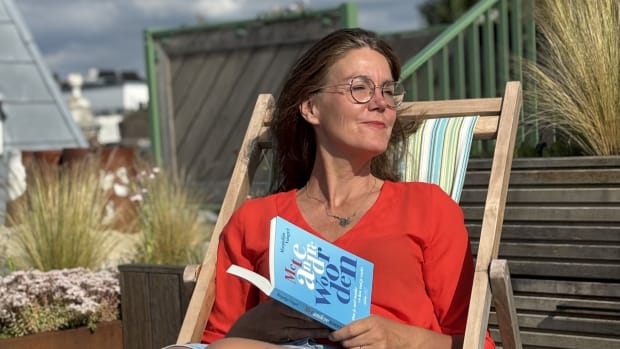
Language has an image problem. Writer Marjolein Voogel wants to change that
Language is in a precarious position, according to writer, sociologist and UvA alumna Marjolijn Voogel. Language studies are rapidly dying out at universities, and in secondary schools, language courses are invariably referred to as “fun subjects”. In her book, Met andere woorden (In other words), Voogel attempts to combat the image problem facing the discipline.
Language is in trouble, you write in this book. Why is that?
“If you look back in history, the humanities were much more important at university than the more scientific subjects. Fields such as theology, classical languages and philosophy used to be at the top of the pecking order, but that has changed significantly over the years. This is probably due, among other things, to the rise of technological developments, which have made us increasingly interested in exact sciences. Nowadays, it’s much cooler to study econometrics than languages, for example.”
“With the advent of new translation techniques and artificial intelligence, it is becoming increasingly easy to translate texts. If I ask a Greek landlord a question in Dutch on Airbnb, he automatically receives the text in Greek. It’s all quite easy, so some people think, why should I learn another language?”
Can you answer that question yourself?
“Language is everything there is, and everything is language. Even though we sometimes generate text with AI, language remains the only way to connect with others. So you also get better at that when you have a better command of a language. My French and English aren’t bad, but when I have a conversation with someone whose native language is one of those two, I still feel insecure because I have fewer registers at my disposal to express myself than I do in Dutch. People sometimes forget that.”
“I see this in education too, where the number of pupils choosing to study languages has fallen dramatically. This trend has been visible for a long time and has been at the expense of enrolment in language faculties. That’s a real loss.”
Was that your reason for writing this book?
“I think so. I wrote it to show that languages are not boring, but incredibly important and, moreover, a social practice. You can’t separate language from everything else we do, hence my sociological perspective. For example, I took part in a workshop in Friesland. I understand Frisian, but I don’t speak it. I was the only one in the workshop, so the working language was Frisian, as agreed. Nevertheless, every time I asked a question in Dutch, I received an answer in Dutch instead of Frisian. This happened automatically, even though it was explicitly not the agreement. This has to do with the fact that Dutch is a more central language and Frisian is a peripheral language. Dutch has more power, strength and capital. That is where the sociological element of language lies.”
One chapter in the book is about street language, which seems to me to be a language variant that involves a lot of sociology.
“That’s right. Street language is generally spoken mainly by young people, but there are also many different variants. The street language spoken at the Barlaeus Gymnasium, for example, is completely different from that spoken at other schools. This shows that language is very much part of your identity. In the chapter, I compare it to clothing, which is another phenomenon young people are very concerned with. They use it to distinguish themselves from others or, conversely, to resemble others. You can see language in the same way: it’s a label you put on yourself. I talk like this, so this is who I am.”
Inclusive language is also discussed in the book. As with street language or certain forms of gender-neutral language, this is something that provokes strong reactions in people. Why does it affect us so much when we try to change or innovate language?
“Language is very close to us. In that respect, language is really different from clothing; you can’t just put on or take off a different language. We have invested a lot of time in our language. Dutch is my mother tongue, the language I have read and discussed for years. You can’t just take that away from someone because it’s so close to their heart. If someone wants to tamper with that, it affects you.”
If we can’t just change language, do we create language, or does language create us?
“Both, it’s really an interaction. Language is constantly changing, we do that together. Some proposals for change are accepted and others are not, which also has to do with time. For example, it is expected that the definite article “het” will eventually disappear. That is quite possible. Look at Dutch from the Middle Ages, or even the seventeenth century. We would have great difficulty understanding the Dutch of that time. Nowadays, language is evolving much faster because everything we do is much faster.”

